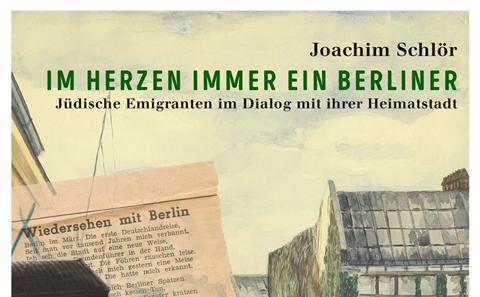The German-Jewish Diaspora and their relationship to Germany: book launch Event

- Time:
- 18:00 - 19:30
- Date:
- 5 October 2021
- Venue:
- Online Event
For more information regarding this event, please email Clodagh Owens at c.owens@soton.ac.uk; parkes@soton.ac.uk .
Event details
This seminar on the German-Jewish diaspora’s relationship with Germany is jointly organised by the Department of History and the Parkes Institute to mark the publication of Professor Joachim Schlör’s latest book, Im Herzen immer ein Berliner: Jüdische Emigranten im Dialog mit ihrer Heimatstadt [I have always remained a Berliner at heart. Jewish emigrants in dialogue with their hometown]. Professor Schlör will speak to his book and the wider questions it raises about how we understand the experience of German-Jewish diaspora. His talk will be followed by a response presented by Professor Anja Siegemund, who is the director of the institution whose repository of Jewish letters furnished the rich source material for the book. The event will end with a Q&A to which audience members are warmly invited to contribute questions and comments.
Details of main talk:
Professor Joachim Schlör, ‘I have often been back to Berlin and think of the city as mine’
In December 1991, the Berlin Senate commissioned a working group to compile a ‘Memorial Book for the Murdered Jews of Berlin’. Alongside the necessary archival research, the group also made contact with ‘former Berliners’: Jews who had been forced to emigrate after 1933 and found themselves in places all across the globe, from Melbourne to Cape Town, from Buenos Aires to San Francisco. The group was overwhelmed by the response. In thousands of letters, correspondents showed their willingness to provide information – but they also wanted to tell their own stories. The letters, stored in the archives of Berlin’s Centrum Judaicum, offer a deep insight into the ambivalent feelings that connect the emigrants and their descendants with the former hometown. The burgeoning dialogue was intensified by the political circumstances of the period: German unification, new access to the Eastern parts of the city, but also news about rising antisemitism and xenophobia in Germany.
Speaker information
Professor Joachim Schlör, Joachim Schlör is professor of modern Jewish/non-Jewish relations and a member of the Parkes Institute at the University of Southampton. He received his PhD from Tübingen University in 1990 and his habilitation from Potsdam University in 2003. His research interests include the cultural history and the ethnography of migration and mobility, of urban life, and the reflection of history in individual experience. Many of his publications are based on personal documents (letters, diaries, photo albums) of German Jews who emigrated to Palestine or to the United Kingdom after 1933. In 2020, he published the English translation of his book on Baroness Julia Neuberger’s mother, Liesel Rosenthal, who came to Britain in 1937: Escaping Nazi Germany. One woman’s emigration from Heilbronn to England. He is the editor of the journal Jewish Culture and History and (with Johanna Rolshoven) co-editor of the online journal Mobile Culture Studies.
Professor Anja Siegemun, Dr. Anja Siegemund is the director of the Foundation Neue Synagoge Berlin – Centrum Judaicum. She received her PhD from the University of Munich, her dissertation discussed German-speaking Zionists in Palestine and Israel and their position towards the emerging Arab-Israeli conflict. From 2009 to 2015, she was the head of the Jerusalem branch of the Leo Baeck Institute, the central institution for the preservation and documentation of German-Jewish cultural heritage. In 2016, she edited a volume on German and Central European Jews – cultural transfers, life worlds, and identities – in the city of Haifa. The Centrum Judaicum is a museum and cultural centre, housed in the partly rebuilt ‘New Synagogue’ of 1866.